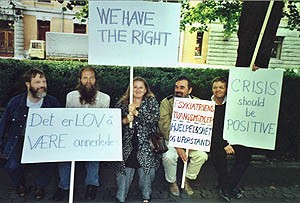European Network of (Ex-)Users and Survivors of Psychiatry
ENUSP gives (ex-)users and survivors of psychiatric services across Europe a way to communicate so that we can support one other in the personal, political and social struggle against injustice and discrimination.

We are the only grassroots umbrella organisation working across Europe to unite local and national organisations of (ex-)users and survivors of psychiatry. We directly represent the views of people who are or have been on the receiving end of psychiatric services.
History
The history of ENUSP goes back to 1990 when survivors in the Netherlands decided to form a European wide network of organisations of (former) psychiatric patients. In 1998 ENUSP received legal recognition and since then we have been a federation of European organisations of (ex-) users and survivors of psychiatry.
We have organised many European conferences including: Zandvoort, Netherlands 1991; Elsinore, Denmark 1994; Reading, England 1997; Luxembourg 1999; Vejle, Denmark 2004, Thessaloniki, Greece 2010 and Hilleröd, Denmark 2014. In Luxembourg over 90 delegates from 26 European countries – all (ex-)users/survivors of psychiatry – met to create an action plan for 2012-2015. The action plan expired in 2015, many actions were not implemented due to the failure to ensure constant funding. In November 2017 an Empowerment seminar was organized in Berlin, where the strategy was reviewed and a new Strategy 2017-2018 was created.
Aims
ENUSP aims to promote the human rights of (ex-)users and survivors of psychiatry and to influence European policy. We fight for (ex-)user/survivor controlled alternatives to psychiatry and against abuse and coercion. The following guiding principle was adopted at our first European conference:
The European Network is against any unilateral approach to and stigmatisation of mental and emotional distress, madness, human suffering and unconventional behaviour.
The European Network should support (ex-)users’/survivors’ autonomy and responsibility in making their own decisions (self-determination).
In order to implement this principle we have prioritised the following areas:
Act against all discrimination (both inside and outside the mental health system) of people who have been subject to the psychiatric system;
- Support the development of (ex-)user/survivor groups throughout Europe (with a particular emphasis on countries where there are no existing organisations);
- Create and support alternatives to the psychiatric system and collect and share information on existing alternatives;
- Influence and try to change current treatments in psychiatry.
Structure
ENUSP is a federation of national and local groups of (ex-)users and survivors, mixed organisations with a significant (ex-)user/survivor membership and individuals from countries where there are no organisations. Our main decision making body is the General Meeting which is attended by a maximum of three delegates from each participating country. All delegates are (ex-)users/survivors.
General Meetings take place at our European conferences which are organised every second year. Between meetings ENUSP is run by an elected board. The board consists of a Chair (elected at the General Meeting) and five regional board members, each representing one of the five regions in Europe (elected by the delegates of the respective region). The board elects a Secretary.
This structure is intended to make ENUSP a grassroots, democratic and fully (ex-)user/survivor controlled organisation.
Our membership is made up of national, regional and local organisations from many European countries. Through our members, ENUSP represents several tens of thousands of (ex-) users/survivors from all over Europe.
We have contacts and collaborations with international organisations active in the mental health field including the World Health Organisation (WHO), the European Union, the European Disability Forum, the International Labour Organisation (ILO) and Mental Health Europe/Santé Mental Europe.
Funding sources
ENUSP rejects money from Big Pharma on principle and it supports the position paper by the European Public Health Alliance from 2001 about the independence of patients’ organisations: all organizations that accept funds from the pharmaceutical industry should, at a minimum, determine an upper limit to the proportion of industry sponsorship and their total income; they should also articulate clearly the role of the sponsoring body in relation to sponsored projects and to the organisation as a whole in their statutes.
Strategy
See Strategic Plan of ENUSP for 2012-2015
See Strategy of ENUSP for 2017-2018
The recent achievements of ENUSP include:
– the organization of our 7th Congress and General Assembly in Hillerod, Denmark,
11-14 December 2014 with the participation of 58 persons from 19 European countries, and the election of a new Board. One day was devoted to a public conference with presentations and workshops led by (ex-)users/survivors including guest speakers from the USA.
– Activities in 2014 included updating of information on members, introducing individual membership, drafting our strategy for fundraising as a result of training provided by EPF and various activities aimed at advocacy and anti-discrimination, including participation at the WHO-Europe/WHO Collaborating Center Lille Congress and follow-up working meetings on empowerment research, representation at the Council of Europe INGO meeting related to the Additional Protocol on the protection of human rights and dignity of persons with mental disorders with regard to involuntary placement and involuntary treatment, publication of a joint position statement in response to the Romanian UN Ambassador Maria Ciobanu and consultations provided by ENUSP to the European Patients’ Forum (EPF).
– Activities in 2015: submission of suggested List of Issues to the UN CRPD Committee in connection with review of EU implementation of the CRPD, as well as lobbying at the upcoming CRPD Committee meeting in Geneva (April 2015) in cooperation with the European Disability Forum (EDF) and the World Network of (Ex)Users and Survivors of Psychiatry (WNUSP), followed by submission of a Shadow Report on behalf of ENUSP and subsequent lobbying and campaigning activities throughout the year; Contribution to the EPF position paper on adherence and concordance and to the European Association of Service Providers for Persons with Disabilities (EASPD) on the necessity of user involvement and the role of service providers; Representation at working meetings of the EU Joint Action on Mental Health and Well-being in Brussels, Madrid and Helsinki during the first and second quarters of 2015.